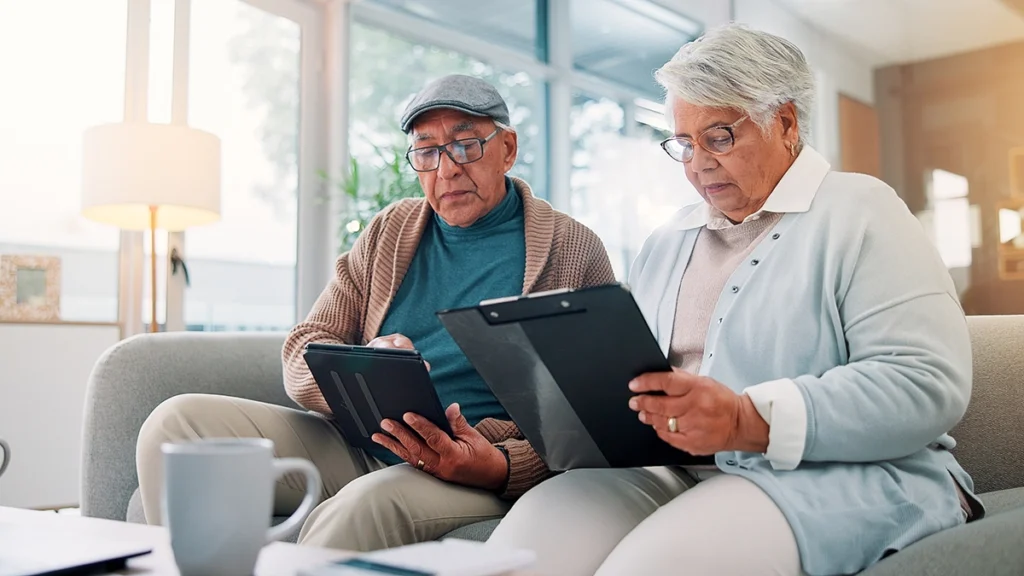Home is where family memories are made, where laughter fills the table, milestones are celebrated, and quiet moments make life feel whole. For many, it is also their greatest financial security and the legacy they hope to leave behind.
But when the possibility of long-term care or Medicaid enters the picture, many homeowners begin to worry: Will my home still be protected?
A Lady Bird Deed can offer peace of mind by helping families preserve ownership and maintain eligibility for essential care programs. Understanding how these deeds work with Medicaid is a key step toward protecting both your home and your future.
Understanding Medicaid and Estate Recovery
Medicaid is a joint federal and state program that helps cover health care costs for people with limited income and resources. While Medicaid can pay for long-term care in a nursing facility, states have the right to recover costs from a person’s estate after their death.
This process, known as Medicaid estate recovery, often targets the home if it passes through probate. For families, the possibility of losing a home to estate recovery creates understandable worry. This is where planning tools like the Lady Bird Deed come in.
They provide a way to secure property for loved ones while still allowing access to care.
What Makes a Lady Bird Deed Different
A Lady Bird Deed is not the same as a traditional life estate deed. In a traditional life estate, the homeowner gives up significant rights once the deed is created. With a Lady Bird Deed, however, the owner keeps full control during their lifetime.
They can sell, refinance, or change beneficiaries without asking permission. The deed only takes effect at death, when ownership transfers automatically to the named beneficiaries. Because the transfer avoids probate, Medicaid estate recovery laws often cannot reach the home.
This makes the Lady Bird Deed especially valuable for families worried about the high costs of long-term care.
Interaction With Medicaid Eligibility
One of the most common questions homeowners ask is whether creating a Lady Bird Deed will affect their ability to qualify for Medicaid. Under current rules, transferring property through a Lady Bird Deed is generally not considered a disqualifying transfer.
Medicaid has a five-year “look-back” period to check for transfers that were made to avoid paying for care. But because the homeowner keeps control of the property until death, the deed does not trigger a penalty.
This makes the Lady Bird Deed a unique legal tool: it helps protect the home for heirs while preserving eligibility for Medicaid benefits.
For example, consider a 68-year-old Florida homeowner who was preparing for retirement while caring for her spouse. She worried about the cost of nursing home care but wanted to keep her home safe for her children. By creating a Lady Bird Deed, she kept the right to sell or mortgage her home if her needs changed.
Years later, when she did enter long-term care, Medicaid helped cover the costs. When she passed away, her children inherited the home directly, without probate and without a Medicaid claim.
Stories like this show how the deed works not just in theory, but in real families’ lives.
States That Recognize Lady Bird Deeds
It is important to note that Lady Bird Deeds are not available nationwide. They are recognized only in Florida, Texas, Michigan, West Virginia, Vermont, and North Carolina. In these states, families can use this deed to avoid probate and possibly shield their home from Medicaid recovery.
In other states, different tools such as trusts may be required. Homeowners should always confirm whether their state allows this option before making decisions.
How Lady Bird Deeds Compare to Wills and Trusts
Some homeowners wonder why they cannot simply use a will or trust to achieve the same result. While a will allows property to pass to heirs, it must go through probate, which opens the door to Medicaid estate recovery. A Lady Bird Deed, by contrast, bypasses probate entirely.
In fact, when properly executed, the deed overrides a will for that property. Trusts can also avoid probate, but they often require more time, expense, and management than a Lady Bird Deed. For many families, the Lady Bird Deed offers a simpler and more flexible alternative.
Flexibility and Control During Life
Unlike other estate planning tools, the Lady Bird Deed does not limit a homeowner’s freedom. Because the owner keeps full rights to the property, they can change their mind at any time. They can name new beneficiaries, revoke the deed, or sell the property.
This control can be especially important when family circumstances shift. For example, a homeowner may want to provide for a new grandchild or adjust plans after a financial change. With a Lady Bird Deed, they are not locked into a decision made years earlier.
Potential Drawbacks to Consider
While the Lady Bird Deed is powerful, it isn’t perfect. Some title companies and lenders don’t fully understand how it works, which can raise questions during refinancing. Beneficiaries can also run into problems if the homeowner falls behind on property taxes or insurance payments.
Because only six states recognize this type of deed, moving elsewhere may reduce its effectiveness. Families should also keep in mind that although the deed can protect the home from Medicaid estate recovery, other assets might still face claims.
Why Timing Matters
Creating a Lady Bird Deed is often most effective when done early, before a crisis arises. Waiting until someone is already in a nursing facility can add stress and risk.
By planning ahead, homeowners can make clear choices and give their families confidence. Early preparation also avoids rushed decisions that might overlook key details, such as keeping property taxes current or updating beneficiary names.
History and Legal Roots of Lady Bird Deeds
The Lady Bird Deed is a relatively modern creation in estate planning. Its unusual name comes from an example once used by lawyers to explain the concept, involving President Lyndon B. Johnson and his wife, Lady Bird Johnson. While no official law mentions her directly, the nickname stuck.
The purpose of the deed was to give property owners a way to keep full control during life while simplifying transfer at death. Over time, several states formally recognized the enhanced life estate as a valid option, cementing its role in estate planning today.
Why Probate Creates Problems
Probate is the legal process that takes place after someone dies. It involves proving a will, paying debts, and transferring property. While probate ensures fairness, it can also be slow, expensive, and stressful for families. For Medicaid recipients, probate is often the point where the state steps in to recover costs.
By avoiding probate with a Lady Bird Deed, families not only save time and money but also prevent their home from being targeted for Medicaid recovery.
This single difference can change the outcome for heirs dramatically.
How Medicaid Estate Recovery Works in Practice
Each state sets rules for how it will recover Medicaid costs. Typically, if a person who received Medicaid owns a home when they die, the state files a claim against the estate. If the home goes through probate, the claim must be settled before heirs can take ownership.
In some cases, this means selling the house to repay the state. Families often feel unprepared for this reality, especially when the home has been in the family for decades. By removing the home from the probate process, the Lady Bird Deed provides a pathway to preservation.
Estate Planning as a Family Conversation
Estate planning is often viewed as a legal matter, but it is also a family matter. Discussing how a home will be handled can prevent conflict later. A Lady Bird Deed gives families a clear plan: the homeowner stays in control during life, and the heirs inherit smoothly at death.
These conversations can reduce uncertainty, give peace of mind, and make sure everyone understands what to expect. In many cases, adult children are relieved to know that their parents’ care needs will not mean losing the family home.
When a Lady Bird Deed May Not Be Enough
While the Lady Bird Deed is valuable, it is not a complete estate plan. Other assets such as bank accounts, vehicles, or investments, may still need planning. In addition, families with complex needs—such as blended families, businesses, or multiple properties—may require a trust.
A Lady Bird Deed should be seen as one tool in the toolbox, not the entire plan. It works best when combined with other documents like a will, a power of attorney, and a health care directive. Together, these tools protect both property and personal wishes.
Looking Ahead: The Future of Lady Bird Deeds
As health care costs rise, more families turn to Medicaid for support while still hoping to preserve their homes for their children. Lady Bird Deeds addresses both goals by connecting care planning with legacy protection. Legal professionals in the states that recognize these deeds continue refining how they apply them, and awareness among homeowners keeps growing. Whether other states will adopt this tool remains uncertain, but its current impact shows how creative legal planning can make a lasting difference.
Common Questions Homeowners Ask
Because the Lady Bird Deed is less widely known, families often have questions. One common question is whether the home can still be sold if the deed is in place. The answer is yes—the homeowner keeps full control, so they can sell the property just as before.
Another question is whether the deed changes property taxes or homestead protections. In most states that allow Lady Bird Deeds, the deed does not disturb existing exemptions. Families also ask what happens if a beneficiary dies before the homeowner. In that case, the homeowner can update the deed and name a new beneficiary, keeping the plan current and flexible.
The Emotional Value of Home
For many people, the home is not just their largest asset but also a place of deep meaning. It is where birthdays are celebrated, holidays are shared, and grandchildren come to visit. Losing the home through Medicaid recovery can feel like losing more than money—it can feel like losing part of family identity.
A Lady Bird Deed can preserve that connection, allowing the home to stay in the family. For the children of aging parents, knowing that the home will remain a gathering place can ease anxiety during difficult times.
Stories From Communities
Across the states where Lady Bird Deeds are recognized, communities share similar stories. Families who once feared probate now feel confident that their home will pass smoothly.
Retirees express relief knowing they can keep control while also planning for care. Adult children often describe the sense of security that comes with clarity.
These community stories highlight a broader truth: estate planning is not only about documents but also about stability, dignity, and love.
Key Takeaways
- A Lady Bird Deed helps protect a home from Medicaid estate recovery by avoiding probate.
- The deed does not affect Medicaid eligibility because the homeowner keeps control during life.
- It is only available in Florida, Texas, Michigan, West Virginia, Vermont, and North Carolina.
- Compared to wills and trusts, it offers a simpler, more flexible option for many families.



